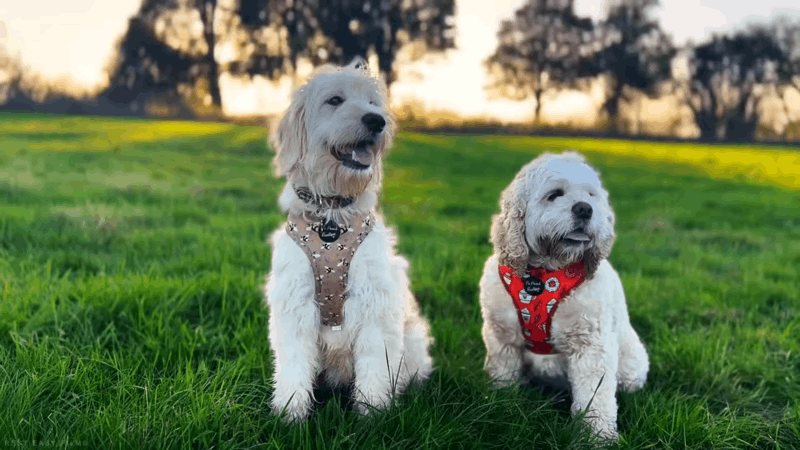No products in the cart.
If you’re wondering, “Will CBD calm my dog down?” you’re not alone. Many pet owners are exploring the potential benefits of CBD for their anxious or stressed canine companions.
The science behind CBD’s calming benefits on dogs, its safety, and how to utilize it to help your canine buddy achieve the peace and calmness they deserve are all covered in this blog. Whether it’s thunderstorm phobia, separation anxiety, or general nervousness, discover the safety to use CBD for puppies and dogs to soothe their anxiety.
The Importance of Calming Down Dogs

Dogs must be calmed down for both their safety and the protection of others around them. Aggression, health problems related to stress, behavioral disorders, and agitation are all possible in dogs.
By promoting relaxation in our furry friends, we not only raise their general quality of life but also foster a more secure and peaceful environment at home and in public places.
Calming techniques, such as gentle training, soothing routines, and providing a calm atmosphere, promote a happier and more balanced canine companion, strengthening the bond between humans and their four-legged friends.
Common Fear in Dogs
Dogs can experience a wide range of common fears that affect their well-being and behavior. Here’s a list of common fears in dogs:
- Separation anxiety: Fear of being left alone or separated from their owner.
- Noise phobia: Fear of loud noises in dogs, such as fireworks, thunderstorms, or gunshots.
- Stranger anxiety: Fear of unfamiliar people or visitors.
- Aggression fear: Fear of other dogs or aggressive behavior from other animals.
- Travel anxiety: Fear of car rides or other modes of transportation.
- Veterinary office fear: Fear of going to the veterinarian or the clinic.
- Grooming fear: Fear of being groomed or bathed.
- Fear of certain objects: Fear of specific objects or situations like vacuum cleaners, bicycles, or stairs.
- Social anxiety: Fear of social interactions with other dogs or people.
- Water phobia: Fear of water or swimming.
It’s crucial to remember that every dog is different, and their concerns could vary. Helping your dog overcome these fears involves training, positive reinforcement, and, in certain situations, seeking guidance from a skilled dog trainer or behavior expert. These efforts can reduce their anxiety and enhance their overall well-being significantly.
Signs Your Dog is Stressed
Recognizing signs of stress in your dogs is essential for their well-being. Common indicators of stress in dogs include:
- Excessive panting: Heavy or rapid panting, unrelated to exercise or heat, can signal stress.
- Shaking or trembling: Tremors or shivering when there’s no obvious cause can indicate anxiety.
- Hiding or avoidance: If your dog starts hiding, avoiding people, or retreating to a safe space, it may be a sign of stress.
- Excessive barking or whining: Unusual or prolonged vocalization may be an expression of distress.
- Destructive behavior: Chewing furniture, digging, or other destructive actions can be a response to stress.
- Changes in appetite: A sudden loss of appetite or overeating can both be stress-related.
- Excessive licking or scratching: Excessive grooming or scratching, leading to skin issues, may indicate stress.
- Changes in body language: Watch for signs like flattened ears, a tucked tail, or a hunched back.
- Restlessness: Stress may be the cause of your dog’s inability to relax.
- Potty accidents: Going inside the house when previously housetrained could be a sign of stress.
- Yawning or lip licking: These can be calming signals dogs use when they’re anxious.
- Pacing: Constant pacing, especially in circles, might be a response to stress.
Determining the cause and taking steps to lessen your dog’s stress are imperative if they display any of these symptoms. These actions may include avoiding triggers, creating a secure and soothing environment, or seeking advice from a veterinarian or certified dog trainer.
How to Calm Dog Anxiety Naturally?

Calmly addressing your dog’s anxiety naturally involves a multi-faceted approach.
Start by establishing a consistent routine with regular exercise and mental stimulation. Incorporate soothing elements like aromatherapy with dog-safe essential oils, gentle massages, or calming herbs, under the guidance of your veterinarian. Provide a designated safe space where your dogs can retreat when anxious, and use positive reinforcement training to gradually desensitize them to anxiety triggers.
Remember that every dog is different, so discovering the best natural therapies suited to your pet’s particular needs requires time and careful study.
Calm Down Medicine for Dogs
Medications to calm down dogs are typically prescribed by veterinarians when natural methods and behavioral training have not been effective or when a dog’s anxiety is severe. The following are some typical medications that veterinarians may prescribe:
- Benzodiazepines: Medications like diazepam (Valium) or alprazolam (Xanax) can be prescribed to provide short-term relief from anxiety. They function by calming the central nervous system, but they should only be used sparingly because they can make your dogs drowsy.
- Selective serotonin reuptake inhibitors (SSRIs): Drugs like fluoxetine (Prozac) or sertraline (Zoloft) are sometimes prescribed for long-term anxiety management. By raising serotonin levels in the brain, they work to assist control mood and lessen anxiety. The full benefits of these drugs often take several weeks to manifest.
- Tricyclic antidepressants (TCAs): Medications like clomipramine (Anafranil) are sometimes used to treat anxiety disorders in dogs. It could take a few weeks for them to start working because they alter the brain’s neurotransmitter levels.
- Alpha-2 agonists: Drugs like clonidine (Catapres) can be prescribed for situational anxiety or for dogs with a history of anxiety-related aggression.
- Natural supplements: Some veterinarians recommend natural supplements like L-theanine, melatonin, or herbal remedies (e.g., valerian root) to help calm anxious dogs. These are generally considered safer than prescription medications but may not be as potent.
- CBD oil: Some dog owners use CBD oil to help manage anxiety in their pets. To make sure the product is secure and suitable for your dog, and to establish the right dosage, it is crucial to speak with your veterinarian.
- Behavior modification in conjunction with medication: When used in conjunction with behavior modification strategies like desensitization and counterconditioning, medications are frequently more effective.
It’s important to remember that only a licensed veterinarian should prescribe and administer drugs. Your dog’s individual needs and the underlying reason for their anxiety will determine the kind of medication, dose, and length of treatment. Additionally, regular check-ups and close monitoring are essential when using medication to ensure your dog’s safety and well-being.
Calming Foods for Dogs
Calming foods for dogs can be beneficial in promoting relaxation and reducing anxiety. Dogs may experience relaxing effects from certain diets and nutritional elements, such as:
- Turkey: Turkey contains tryptophan, an amino acid that can help promote the production of serotonin, a calming neurotransmitter.
- Bananas: Bananas are a good source of vitamins and minerals, including vitamin B6, which aids in serotonin production.
- Blueberries: Blueberries, which are high in antioxidants, can benefit a dog’s cognitive development and general health.
- Sweet potatoes: These give a constant source of energy and a source of fiber and complex carbs, which can help control blood sugar levels.
- Oats: Oats are high in fiber and can provide a slow-release source of energy, helping to keep a dog calm and satisfied.
- Pumpkin: Pumpkin is rich in fiber and can support digestive health, potentially reducing gastrointestinal-related stress.
- Chamomile: You can brew a mild chamomile tea (caffeine-free) and add it to your dog’s food in moderation for a calming effect.
- Valerian root: Valerian root is an herbal supplement known for its calming properties. It can be used sparingly and under veterinary guidance.
Before introducing new foods or supplements to your dog’s diet or making large nutritional changes, always speak with your vet. And remember that a balanced and appropriate diet tailored to your dog’s specific needs is crucial for their overall health.
Will CBD Calm My Dog Down?

CBD is gaining attention for its ability to help dogs relax, as it interacts with their endocannabinoid system, responsible for regulating mood and anxiety, among other bodily functions. Some dog owners have reported positive results in reducing anxiety and promoting relaxation in their pets when using CBD products specifically formulated for dogs.
Prior to giving CBD to your dog, you must speak with a veterinarian as the dosage and formulation can differ greatly and there may be possible interactions with other medications or underlying health concerns to take into account. CBD should always be used under professional guidance to ensure its safety and effectiveness for your specific canine companion.
Can I Give My Puppy CBD to Calm Him Down?
Using CBD to calm a puppy should be approached with caution. While some pet owners have reported benefits, it’s essential to consult with a veterinarian first. Puppies are more sensitive to medications and supplements, so finding the right dosage and product is crucial.
The vet can provide guidance on whether CBD is suitable for your puppy’s age, breed, and specific needs, ensuring both safety and effectiveness in managing their anxiety or stress.
Can I Give My Dog THC to Calm Him Down?
It is not recommended to give dogs THC. THC is poisonous to dogs and can have a variety of negative effects. Before utilizing cannabis-derived products to treat your dog’s anxiety or other issues, consult your veterinarian instead. Your vet can suggest secure and acceptable alternatives, such CBD products. Always prioritize your pet’s safety and well-being when exploring potential treatments.
Conclusion
“Will CBD calm my dog down?” is a common question among pet owners seeking natural solutions for their canine companions’ anxiety. While CBD shows promise in this regard, its effectiveness varies, making it essential to consult with a veterinarian for personalized advice. You can decide whether to include CBD to your dog’s wellness routine in order to promote relaxation and well-being by being aware of its potential advantages and drawbacks.
Hello, I am Hazel Bennett, an experienced copywriter specializing in the fascinating topic of CBD for dogs. With a passion for pet wellness and extensive knowledge of CBD’s potential benefits, I am here to provide you with informative and engaging content.



